As homeschoolers, we love our field trips! And truthfully, almost anything can morph into a field trip after awhile. Nearly every drive we take, we work one in somewhere, at some point. That was the case recently when we had to take an all-day drive from Boise to Oregon to see extended family. Looking to break up the long hours somewhere, we chose to visit the National Historic Oregon Trail Interpretive Center in Baker City, Oregon. We were not disappointed. It was the right combination of history and fun to pass a few hours. Also, with the available outdoor trails, it would be an ideal location to spend nearly a whole day provided the weather is right.
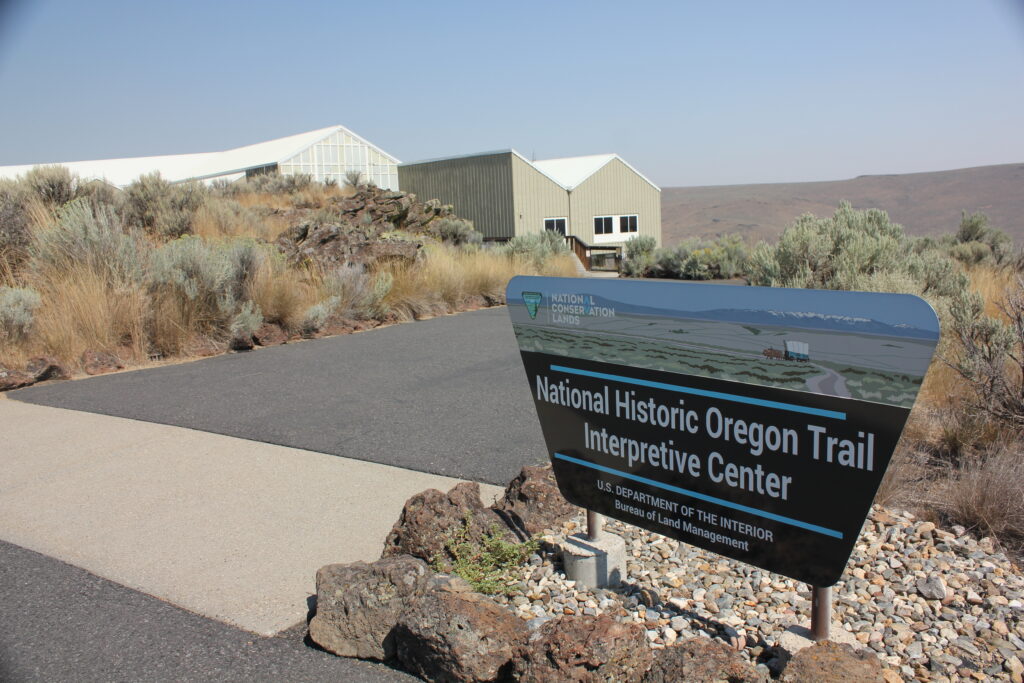
Reading Up
There are PLENTY of quality library books on the Oregon Trail for any age. However, we just used the resource we had on hand to prepare the kids:
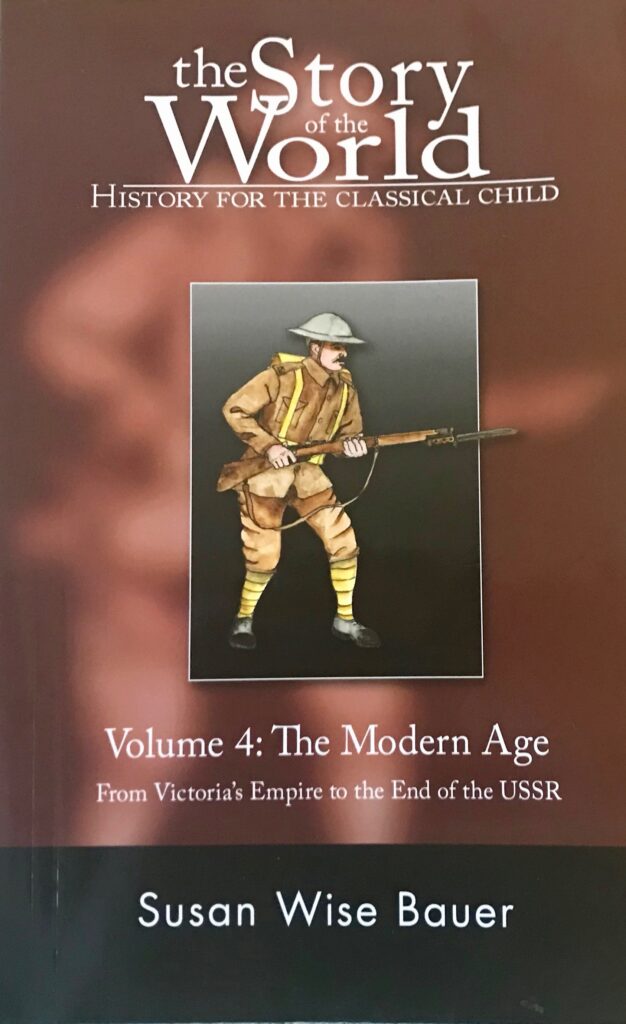
If you prefer listening to the story, which I definitely recommend, you can find The Story of the World on audio CDs, often available through the public library.
This was not the first time we encountered anything to do with the Oregon Trail. Although we had just moved to the Pacific Northwest the previous year, we had been visiting Oregon, Washington, and Idaho for years prior. In our travels, we had seen authentic Oregon Trail ruts before on a few occasions in different locations.
In fact, on a drive from Salt Lake City to Yellowstone back in 2016, after JUST listening to the Oregon Trail story mentioned above, we unexpectedly came across this:
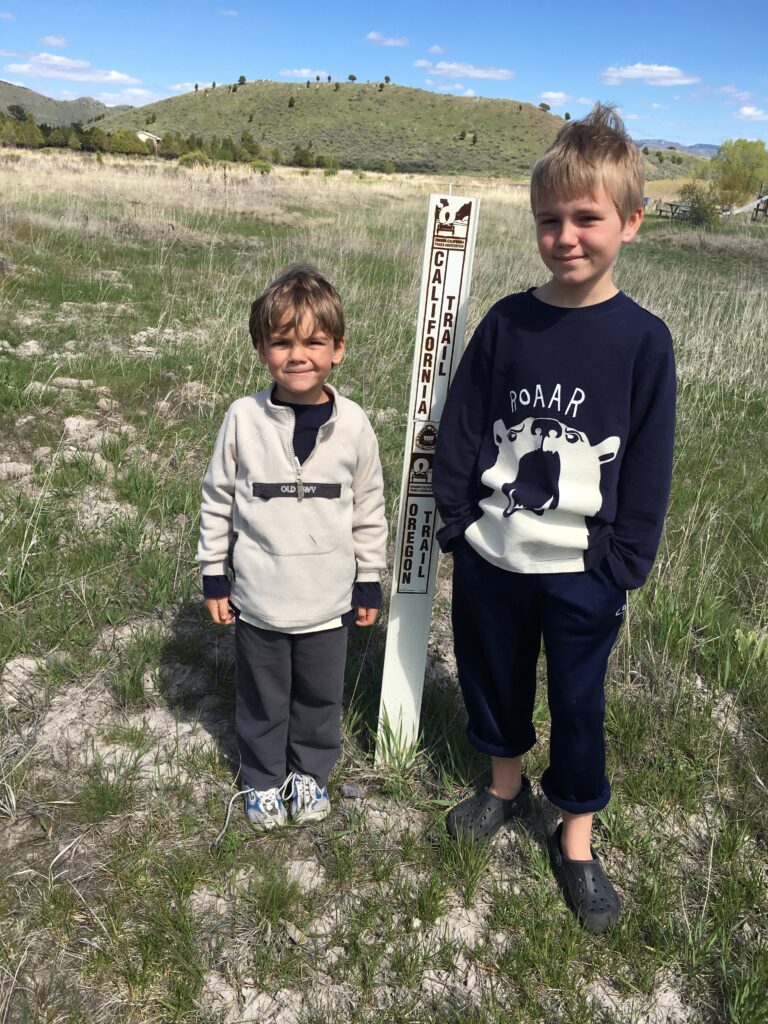
So, although we had experienced little bits of the Oregon Trail, and my kids knew the basic outline of what it was and meant, it was time to go a little deeper.
Getting To the Oregon Trail Interpretive Center
Directions
The National Historic Oregon Trail Interpretive Center is an easy detour off the main road, I-84. Take Exit 302 in Baker City and follow the signs five miles to the center. The topography of the rural drive to the center will already begin to show you what the Oregon Trail families had to travel through on their way to a potentially better life in the West.
As you approach the center itself, on the right-hand side of you will see this poignant memorial to the lives lost on the Trail.
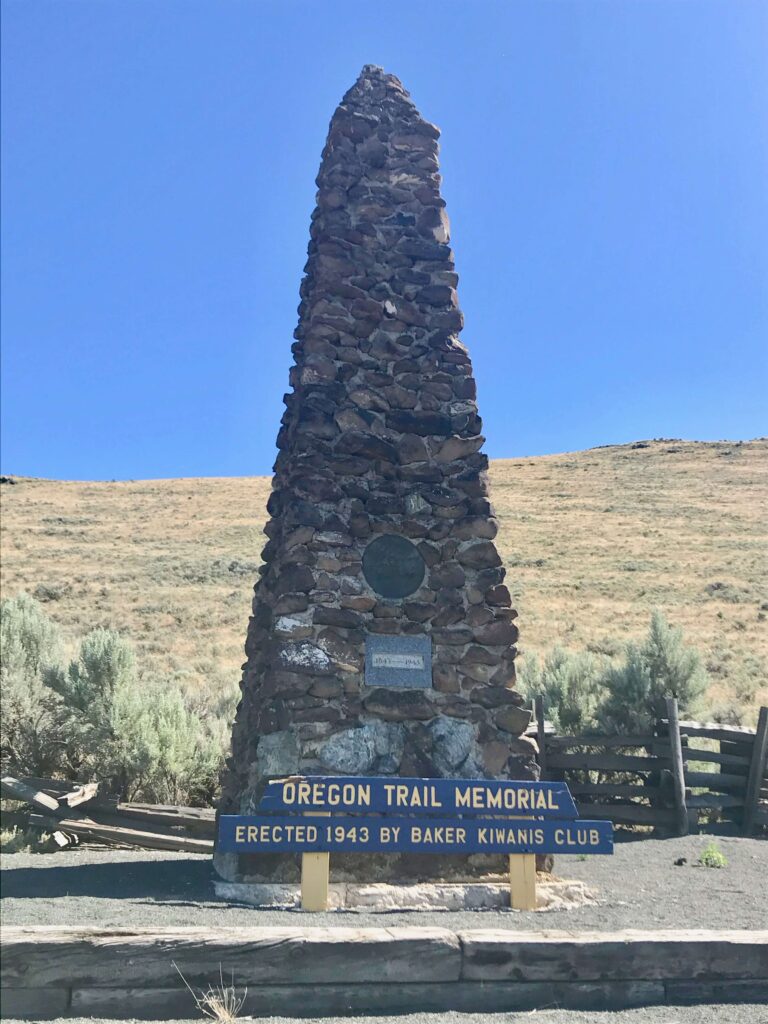
Cost
For us and all other visitors that day (and for an unspecified current season), it was the very best price of all–free! But when their normally listed prices, which change according to the time of year, are back up, it is still possible to visit for free with an annual America the Beautiful or Every Kid Outdoors for 4th Graders national park passes.
The Oregon Trail Interpretive Center Itself
Outdoor Wagon Exhibit
Upon arriving at the center itself, we checked out the fun outdoor wagon exhibit before heading indoors. It brought home the small size of the typical wagon the families would travel with. We learned how the wagons would circle in the evening to protect the group and keep their animals from wandering off. Most would sleep on mats inside the circle while the men took turns to watch for danger outside.
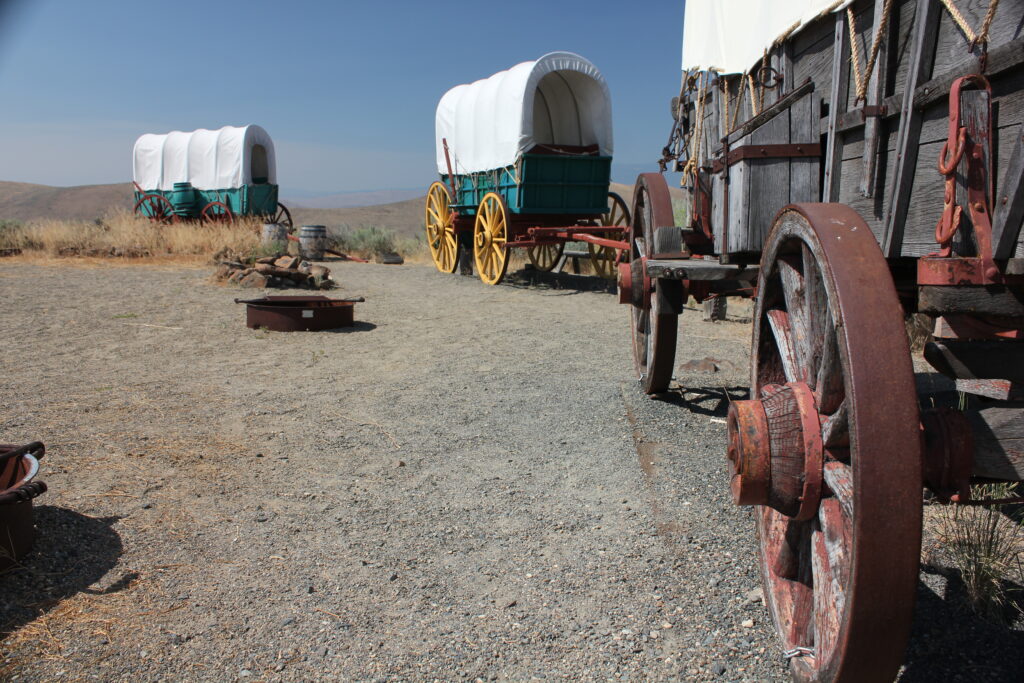
My kids learned that kids on the Oregon Trail did not generally get to ride in the (relative) comfort of the wagon. Instead, they walked…and walked…and walked some more. In addition, they had many jobs along the way, like gathering bison dung to use as fuel for their cooking fires. It was all hands on deck to make the trip as successful as they could.
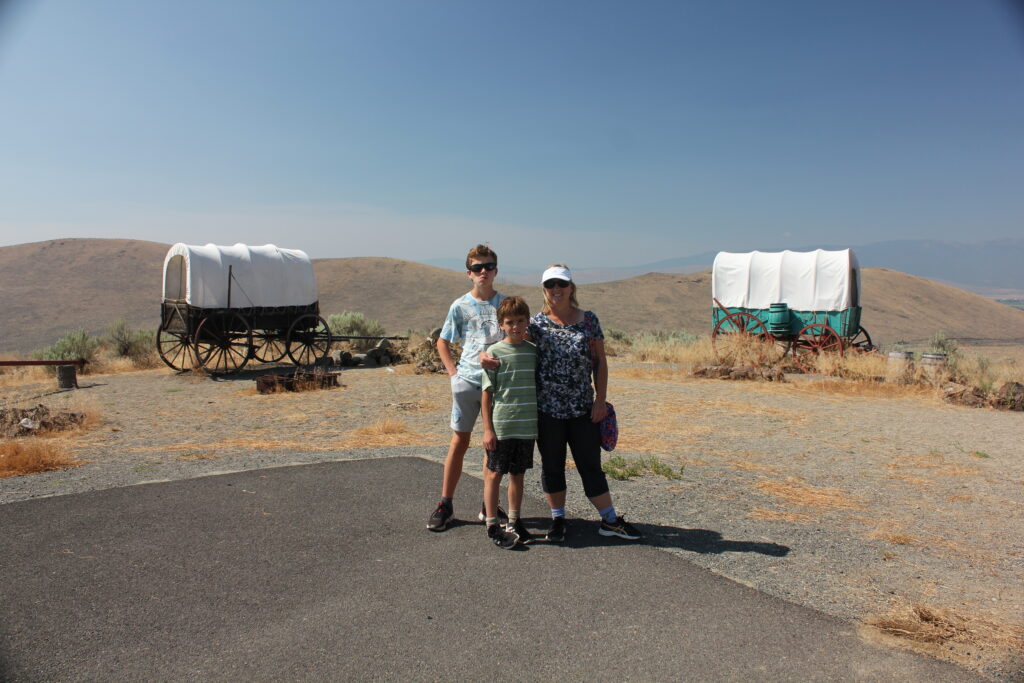
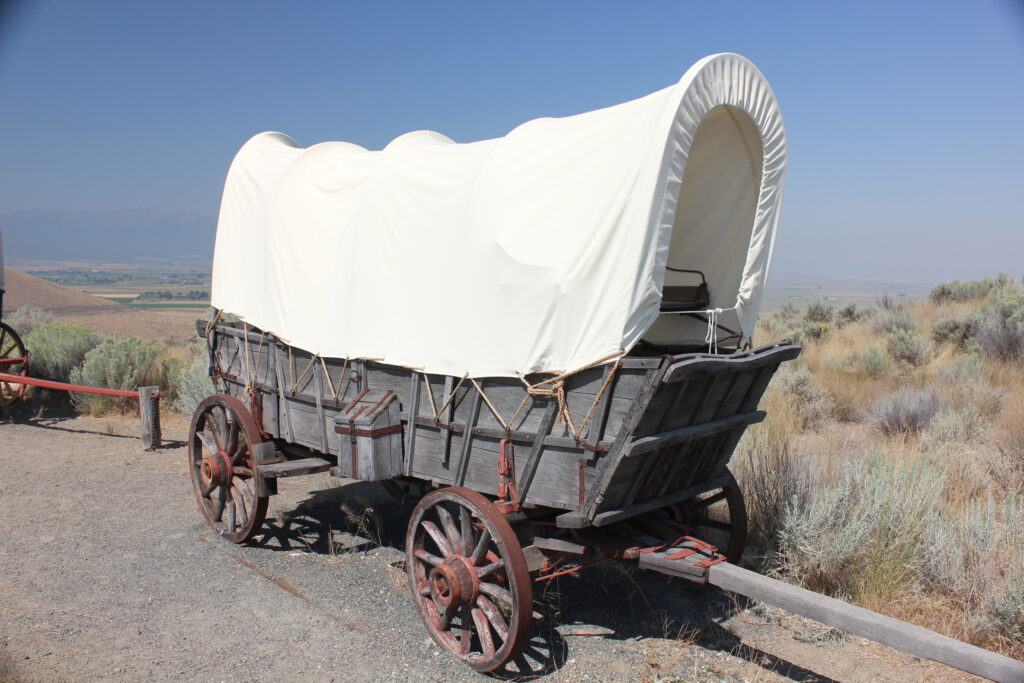
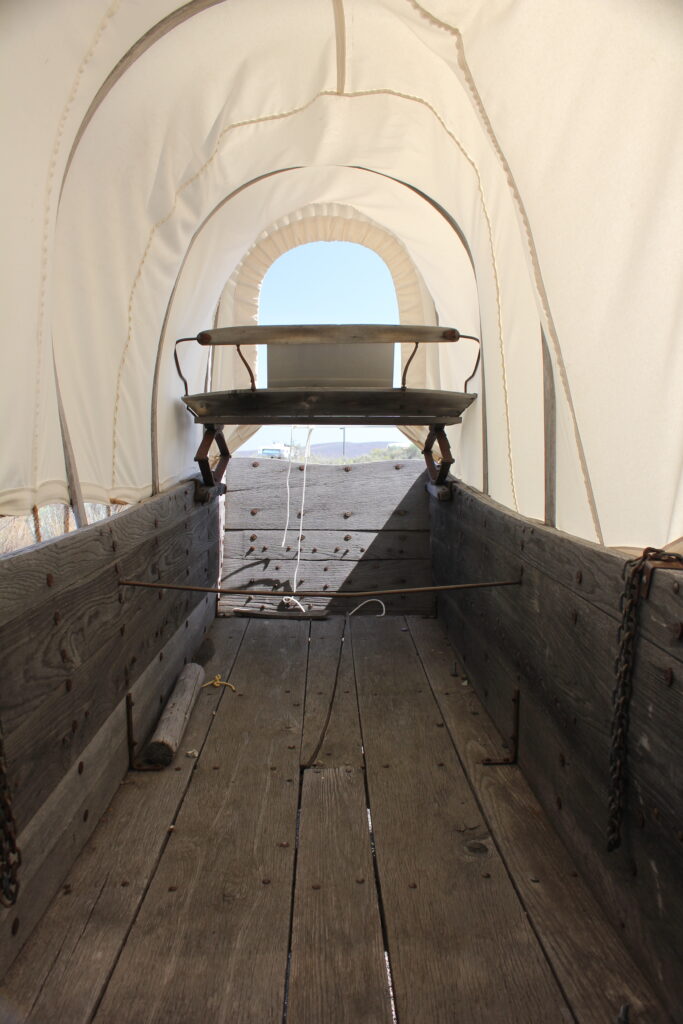
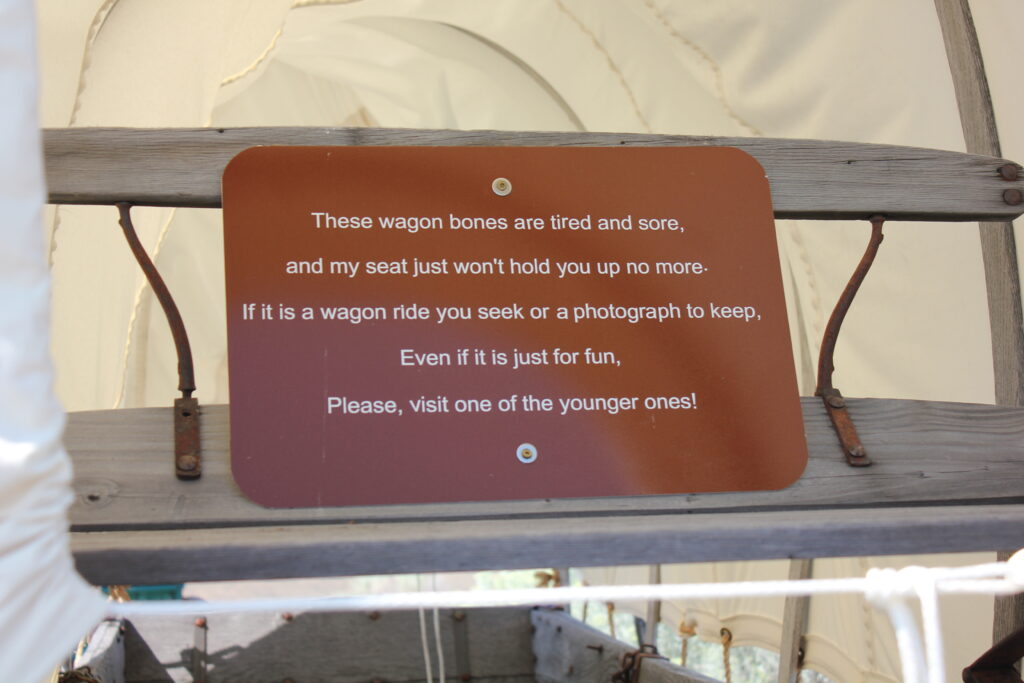
Heading Indoors
The indoor displays were well-laid out and fun for all ages. I didn’t feel bogged down by too much information, and the kids enjoyed the life-sized people and animal figurines to depict various scenarios the pioneers would have faced along the Oregon Trail.
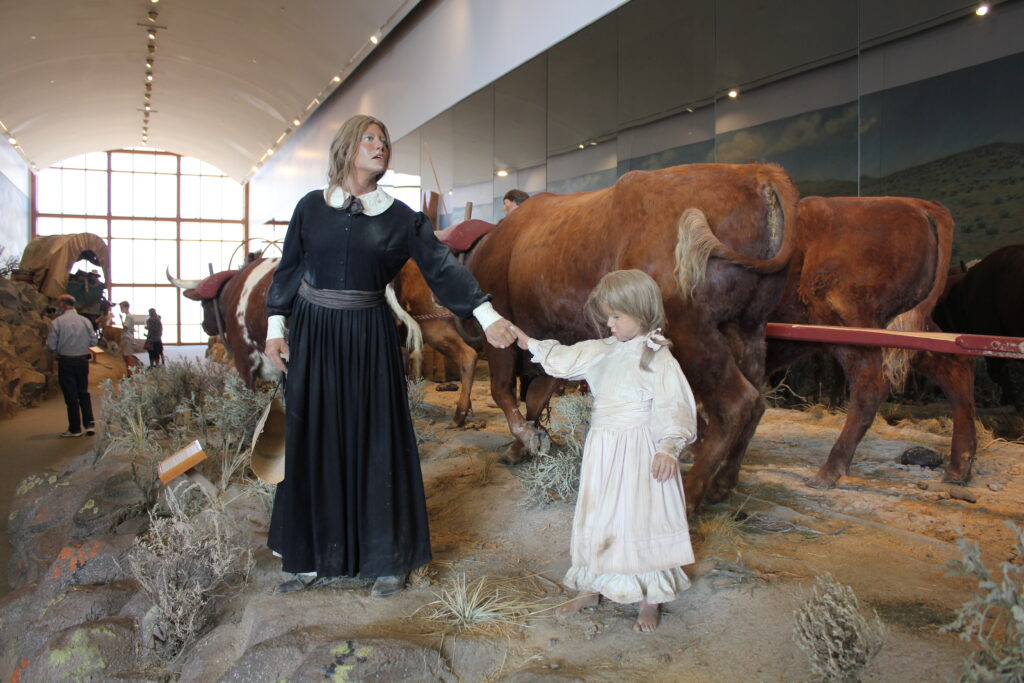
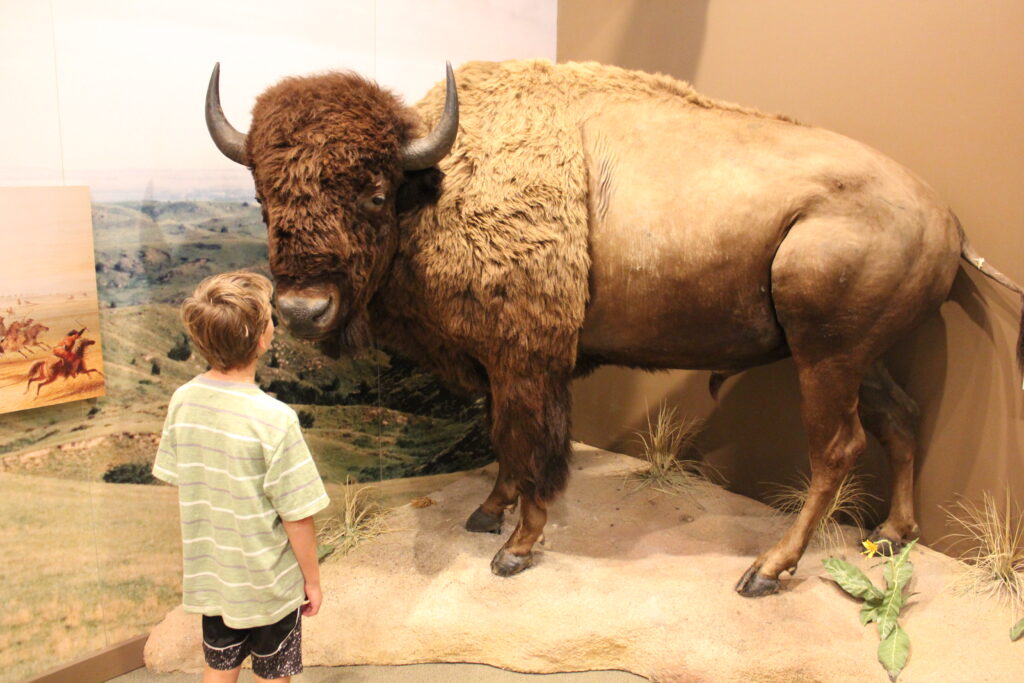
Cool Facts About the Oregon Trail
We learned a ton about the many hazards and life on the trail from this center. Here’s just a sampling of what we gleaned:
1. Ten percent of the people died along the trail.
Obviously, hazards were plentiful. The trail goers faced perils on all sides: disease (mainly cholera), accidents (like drowning or getting smashed under wagon wheels), rattlesnake bites, etc. Although attacks from Native Americans did happen as well, in reality they were relatively rare. In fact, Native Americans were often helpful to those on the trail and often traded with them.
After many years of travel, the Oregon Trail was positively littered with grave sites along the way. Sobering thought.
2. With no legal system to turn to, wagon parties had to take matters into their own hands.
I regret not remembering the name of, or writing down the exact info I read, but in one wagon party, one man got into a skirmish with another and killed him. The murderer, who apparently was well liked by everyone in his party except for the man he had murdered, readily confessed to his crime. The other adults in the party now had to decide for themselves how to punish the murder. They settled on execution, which I’m sure was a horrific decision to come to. Six men lined up to shoot the murderer, but only three had bullets in the guns. Of course, each did not know whether he had a bullet or not. Thus, they swiftly carried out the execution order. Truly a tragic situation all around.
3. Oxen were the preferred animal of choice to pull the wagons.
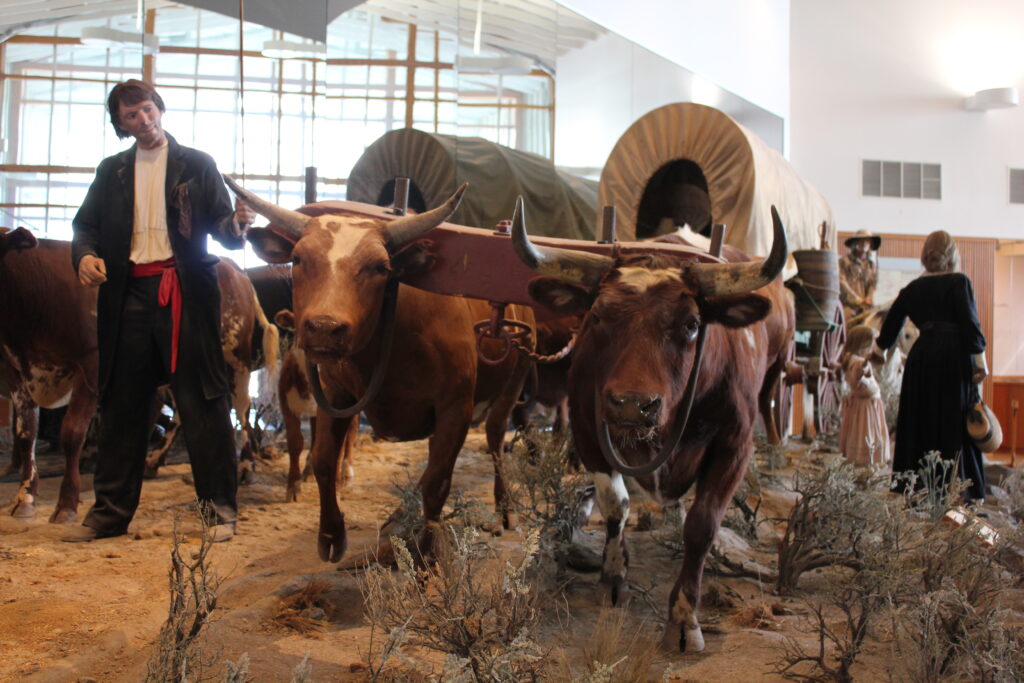
Oxen were the best-suited animals for the long trip and could survive on sometimes poor prairie grasses, unlike horses. They were slower than mules but more reliable and could pull a fully-loaded wagon for miles and miles. So, most families opted for a pair of oxen if they could swing it.
4. Oregon was not the only destination for the thousands of pioneers.
Other families settled in Utah, California, Washington, Wyoming, or Idaho.
5. The trail, in addition to being littered with graves, was littered with trash (including food!) that other pioneers had tossed away to lighten their load.
Occasionally these discarded items could be put to use, such as burning furniture as fuel that night for a cooking fire.
I honestly cannot imagine the sacrifice and desperation most families on the six-month journey faced, or the agony they felt upon losing a child, spouse, or parent. It makes our lives look pretty darn good by comparison.
The Oregon Interpretive Center Outdoor Trails
If you visit, definitely take the trails. On them you can, of course, see the wagon ruts themselves, helping to bring the history you just learned alive. Be sure and watch for snakes, though! We weren’t fortunate enough to see any out there the day we visited (my kids always find it a bonus to see a snake of any kind), but there’s a definite possibility you might.
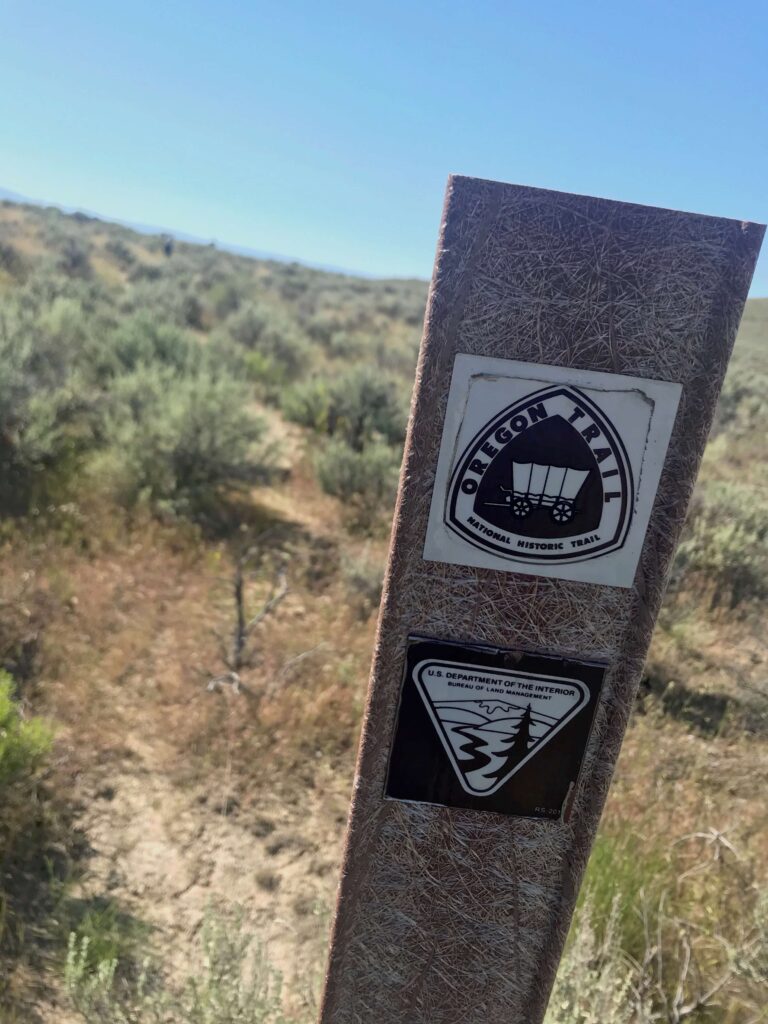
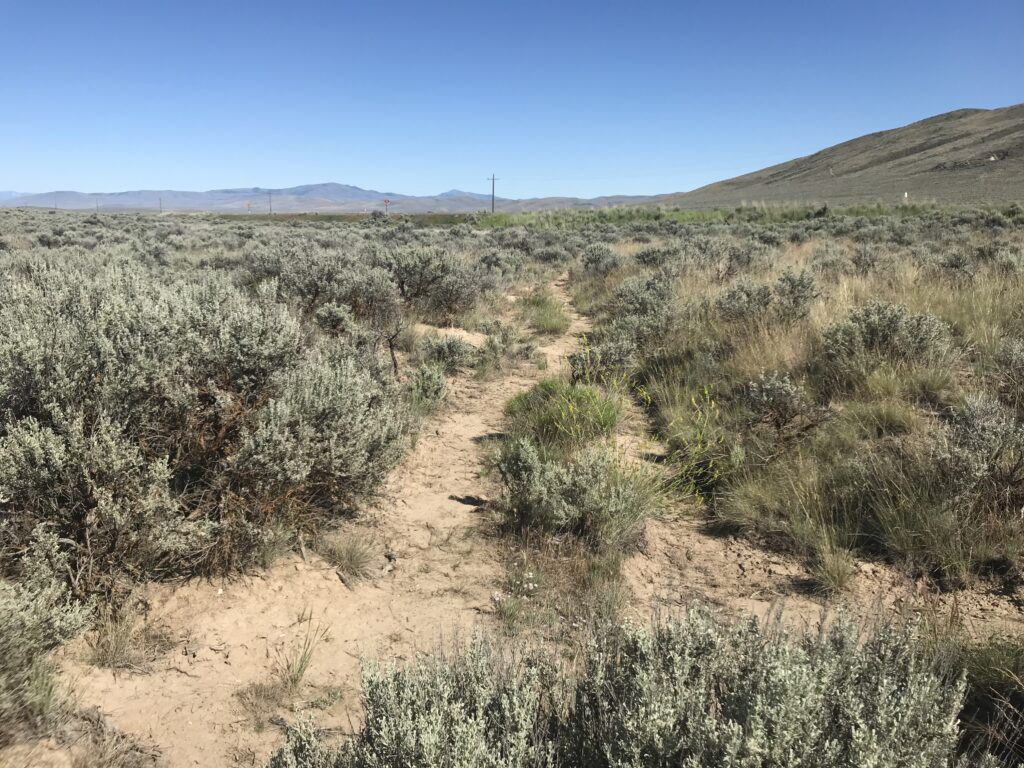
What sites along the Oregon Trail have you visited? Or what other unique facts that I didn’t mention do you know about the Oregon Trail? Comment below and share this post!
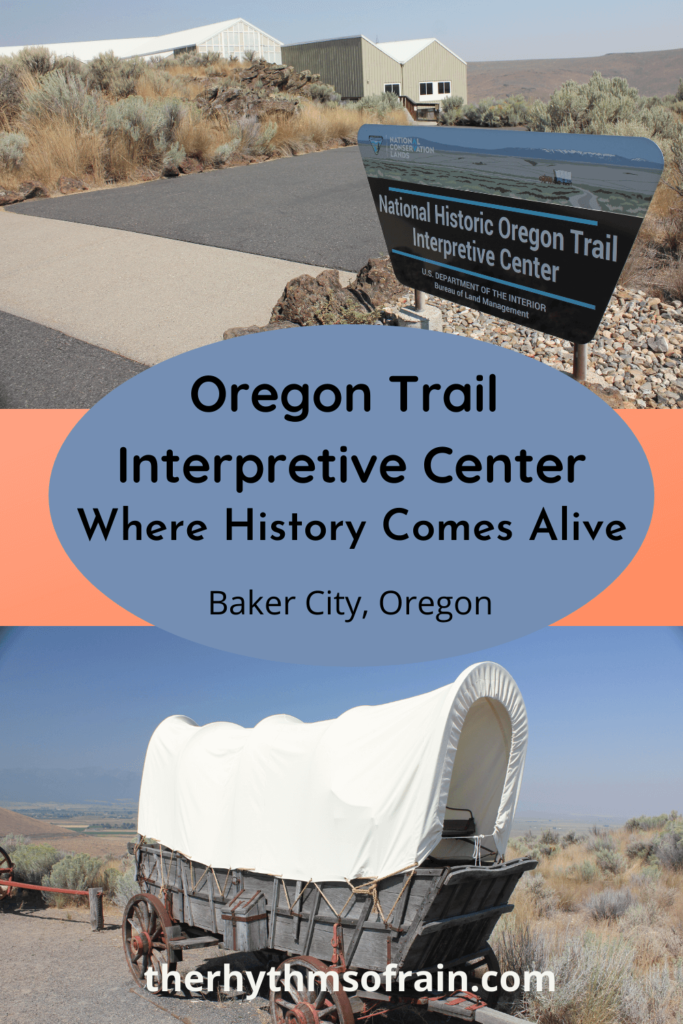
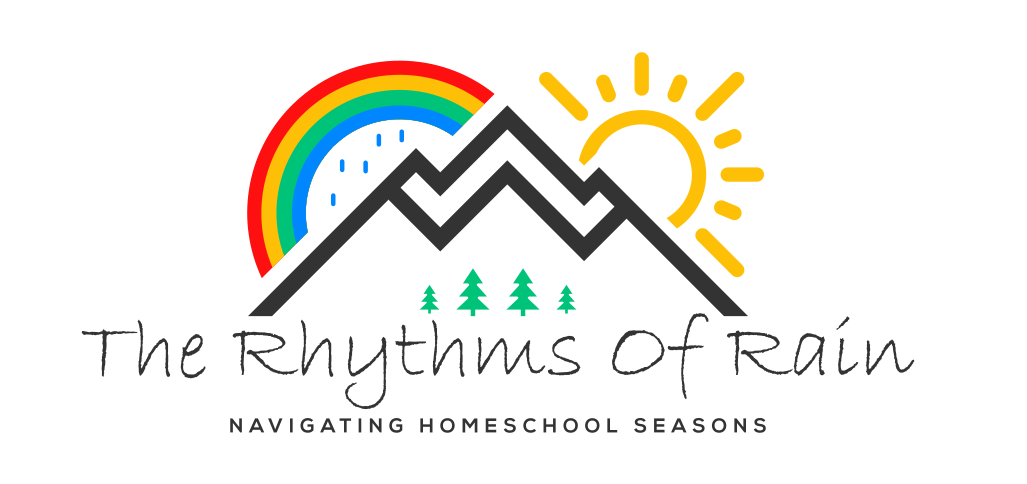
What a fun place to visit with the family! When I was a kid my sister was obsessed with the Oregon Trail game!
I just saw that game at our local library and now want to try it!
Sounds like a cool experience! I love how do you stumbled on it the first time.
This is fascinating and what a fun trip to learn. In a previous job, I used to drive the back roads of the state I lived in and marveled at the strength of people who lived and worked in the early years of the state. I would always comment to my kids on the drive (so much they would repeat it) “Imagine crossing this land in a covered wagon.” A hard life for sure. Thanks for your post.
Sounds like a great trip. I would definitely enjoy the trails and I had no idea that wagons were so small!
I have the computer game and bought the more recent card game! Never thought about the people on the trail having to be judge, jury and executioners!
Sounds like such a fun spot to visit, especially with the kids!
Those were some hardy folk back in the day! Thanks for sharing this!
This is really cool! Especially the fact that there are still wagon ruts. It truly makes it more real than just history!
This looks like a perfect stop on a road trip! I love learning on trips!
What a great learning trip. It is fascinating to hear all the stories.
Looks like a fun trip. The wagon exhibit looks interesting!
It’s so neat that they get to see these landmarks as part of their learning experience!
I love this and want to go! I have always been fascinated by stories of the Oregon Trail.
I just heard about this place while I was researching road trip stops to make. That is so cool you guys got to visit it!
Such an interesting post. Loved reading about the wagon exhibits. Would love to visit someday!
This looks like a lot of fun! I love the book recommendation as well as all of the photos!
I haven’t been there in many, many years, but I do remember those wagons! What a fun trip.
This looks so interesting from an historical perspective. Super informative!
I loved learning about the Oregon Trail in school. I can’t wait to share the experience with my own kids and I hope we make it here someday!
I didn’t know there was a center for the OR trail. There was an educational “game” my kids did in school based on the Trail. I bet they’d love to know about this.
How interesting! The story behind the wagon trail back in the days makes you realize that struggles they went through. Would definitely visit!
I would love to visit Oregon again! This would be so fun to visit – I never made it to the end of the trail during grade school!
Wow! Looks like a perfect spot to go with the kids! We haven’t made it to Oregon yet, but it’s on the list!
Parts of Oregon are quite gorgeous, especially the wild & wonderful Oregon coast!
What a wonderful, interactive visit! I kept thinking looking at the pictures of the wagons, what a bumpy ride and a lot of sore backsides that trip must of created! Thanks for sharing your time there.
This was super interesting to read, gosh I felt like I was in History class again reading along. You did an excellent job, thank you for sharing! 👍🏼
I love visiting historical places. This place looks fun.
That looks like a great trip!! I would love to get there some day!!
I’d love to visit! I’ve read a lot about the Oregon Trail and my kids and I played the educational video game.
I lived in Baker from 1956 until 1967. My dad was the high school principlal. I don’t remember a museum. Too bad we didn’t take advantage of what was there.
It may very well not have been there at that time. But wow, didn’t know you had lived there! Such pretty country.
So much history! I love the covered wagons. Looks like a great place to visit.